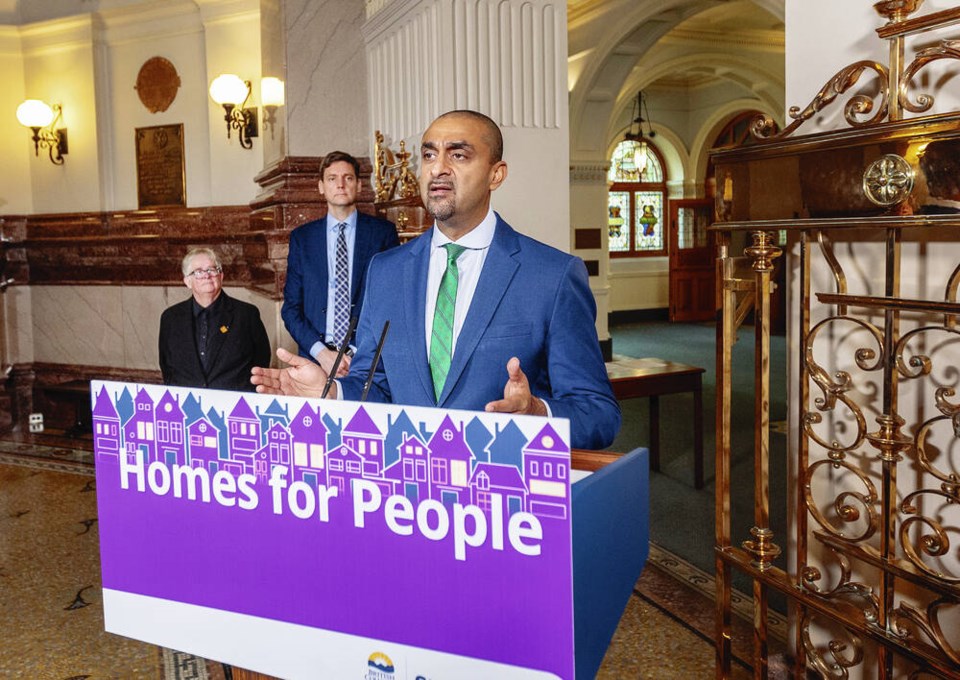Potential unintended consequences highlighted the last few hours of debate on the B.C. government’s new law to suppress short-term rentals.
The bill passed through the legislature this week in relatively short order. But the arguments are far from over, particularly about the estimated 1,600 units in Victoria that were allowed to carry on as short-term rentals after earlier municipal restrictions were imposed. That municipal “legal non-conforming” designation will be supplanted in May by provincial law banning short-terminal rentals except in primary homes and one secondary suite.
Premier David Eby took those owners on directly last week, when he said the law is aimed at “profit-driven mini hotel operators.”
Housing Minister Ravi Kahlon said owners have the next six months to decide whether to rent to long-term tenants or sell their units.
There was an immediate impact on the market right after introduction of the bill, he said. “What we’ve seen in just the last 48 hours is an increase in listings of people selling in those buildings, and so either it will become a [long-term] rental for somebody who needs it in our community or it’ll become a home for somebody else.”
That is the hope, but whether it works as intended is up in the air.
A person familiar with the market said one owner listed a unit for $445,000 a few months ago and got a relatively low-ball offer this week for under $400,000 from a company with no visible presence in B.C. It gave only hours for the owner to accept.
Kahlon said: “It is too early to assume that people are going to lose money on their investments.”
It depends where and when they bought.
“Prices have gone up significantly, so I just won’t accept the premise that people are going to lose money on their investments.”
The main point of the law is to “try to get more housing back to people in our communities.”
But opposition critic Karin Kirkpatrick said that presumes owners’ costs will be covered at a time when interest rates have gone up and more recent buyers bought in at a premium.
She said all MLAs have heard from people who have lost up to 30 per cent of their equity in recent months.
The viability of the units for long-term use is also open to question.
Many of them are micro-suites purpose-built for short-term stays and are little more than hotel rooms.
Kahlon said 440 square feet is still bigger than the RVs some people are using because they can’t find a place to live.
“It’s not an ideal square footage for a lot of families, I get that. But there are still people who are desperate for housing that could use … even 440 square feet.”
There are multiple issues and grey areas — unique strata-titled properties in Parksville, for example — that will be addressed with regulations. They are coming in short order, with the first batch due this fall.
Although 30 municipalities have bylaw restrictions on short-term rentals, government-compiled data suggests they are widely ignored.
Officials also said 42 per cent of Victoria’s short-term rental-licence holders live out of town.
They cited a study showing 10 per cent of hosts earn nearly half the revenue, but that’s disputed by some hosts, who say it counts property managers as hosts when they are managing many units held by individuals.
There are no estimates of how many staff will be hired to police the new restrictions across B.C. But there is some crowd sourcing of that function, as neighbours go online to identify unlicensed operators.
“Every day, there are people tweeting at local government officials in Vancouver with another listing they have found,” Kahlon said.
Municipalities struggled to deal with such complaints, but the ability to monitor and enforce it is vastly enhanced under the new law.
An extensive registrations system will apply to owners and the platforms that advertise rentals and data will be shared with the finance ministry, which tracks home ownership for the speculation and vacancy tax. “Penalties associated with not disclosing correctly are much more substantial than even the fines we’re considering …,” said Kahlon.
Those fines will be in the range of up to $50,000 for owners and $100,000 for platforms that manage and host such rentals, and they will apply per day.
After all the earlier ineffectual “crackdowns” over the years, this one really qualifies as such.
>>> To comment on this article, write a letter to the editor: [email protected]



